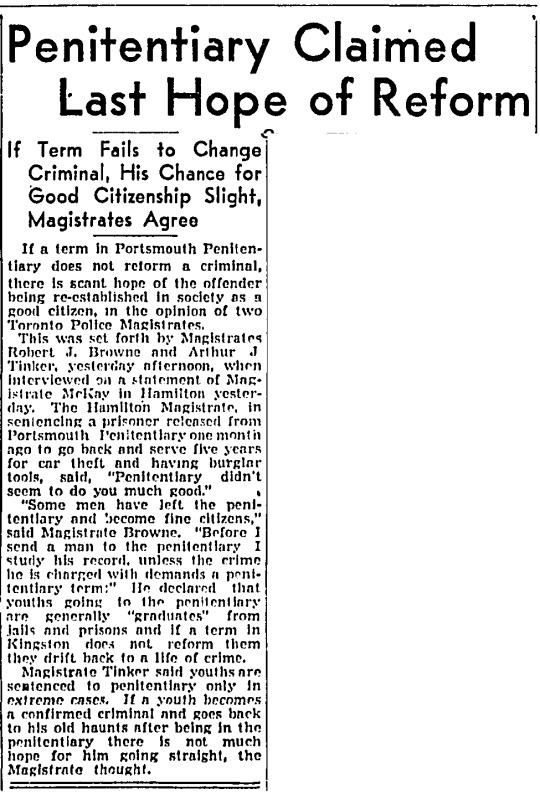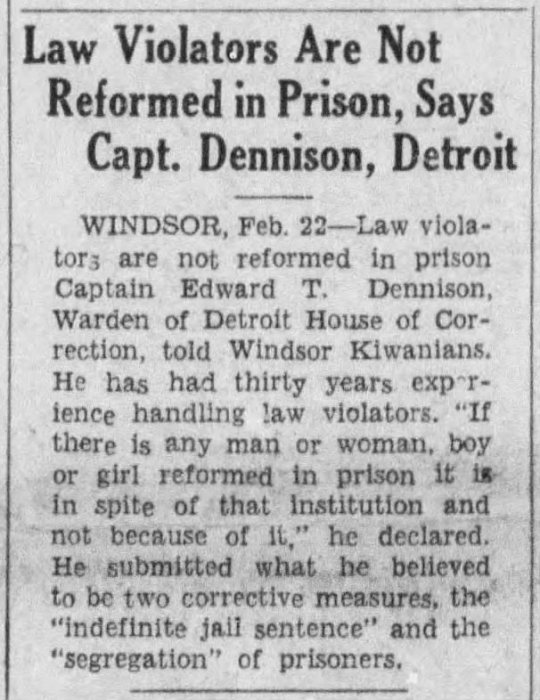#failure of rehabiltation
Photo

“Penitentiary Claimed Last Hope of Reform,” The Globe and Mail. January 22, 1938. Page 9.
---
If Term Fails to Change Criminal, His Chance for Good Citizenship Slight, Magistrates Agree
----
If a term in Portsmouth Penitentiary does not reform a criminal, there is scant hope of the offender being re-established in society as a good citizen, in the opinion of two Toronto Police Magistrates.
This was set forth by Magistrates Robert J. Browne and Arthur J Tinker, yesterday afternoon, when Interviewed sa a statement of Magistrate Mckay in Hamilton yesterday. The Hamilton Magistrate, in sentencing a prisoner released from Portsmouth Penitentiary one month ago to go back and serve five years for car theft and having burglar tools, said, "Penitentiary didn't seem to do you much good."
"Some men have left the penitentiary and become fine citizens," said Magistrate Browne. "Before I send a man to the penitentiary, I study his record, unless the crime he is charged with demands a penitentiary term." He declared that youths going to the penitentiary are generally "graduates" from jails and prisons and if a term in Kingston does not reform them they drift back to a life of crime.
Magistrate Tinker said youths are sentenced to penitentiary only in extreme cases. If a youth becomes a confirmed criminal and goes back to his old haunts after being in the penitentiary there is not much hope for him going straight, the Magistrate thought.
#kingston penitentiary#sentenced to the penitentiary#last chancers#repeat offenders#habitual criminals#rehabilitation#failure of rehabiltation#prison doesn't work#tough on crime#great depression in canada#crime and punishment in canada#history of crime and punishment in canada#ex-convicts
0 notes
Photo

“Law Violators Are Not Reformed in Prison, Says Capt. Dennison, Detroit,” Kingston Whig-Standard. February 22, 1933. Page 1.
---
WINDSOR, Feb. 22— Law violators are not reformed in prison, Captain Edward T. Dennison, Warden of Detroit House of Correction, told Windsor Kiwanians. He hu had thirty years experience handling law violators. "If there is any man or woman, boy or girl, reformed in prison, it is in spite of that institution and not because of it,” he declared. He submitted what he believed to be two corrective measure, the "indefinite jail sentence” and the "segregation” of prisoners,
#windsor#detroit#detroit house of correction#prison officer#rehabilitation#failure of rehabiltation#prison doesn't work#accidental abolitionist#penal reform#classification and segregation#utopia of classification#indefinite sentence#indeterminate sentence#great depression in canada#american prison system#history of crime and punishment#kiwanis club
0 notes
Photo

“Relate Brutal Actions Of Penitentiary Guards,” Ottawa Citizen. February 11, 1937. Page 20.
----
Canadian Press
TORONTO, Feb. 10 - Mr. Justice Archambault, chairman of a royal commission Investigating Canada's penal system, agreed today after hearing stories of brutality at Kingston penitentiary that a 'training school for prison officers' should be established.
The Montreal jurist heard Alfred Crossley, who said he was the first teacher at the Kingston prison, tell of seeing a convict pulled from his cell by a guard who "kicked him like a football" from one building into another. The prisoner’s head was bashed three times against a wall, he said.
Cursed By Guard.
Rev. A. E. Smith, representing the Canadian Labor Defence League, had previously told the royal commissioners that a Communist prisoner, who asked to be chanced from a corner cell without light or fresh air because he was ill, was cursed by a guard.
'It is not a crime to be a Communist," remarked Mr. Justice Archambault, "There must be training school for all officers in penitentiaries. Men are placed in these positions who are quite unfit to handle men or to make decisions."
The commissioner's comment was echoed by George Hoadley, former minister of health for Alberta, who said he opposed the political nature of appointments to penitentiaries unless training and ability were taken into consideration.
"Importance of careful selection and training of personnel for penitentiary connections cannot be over-emphasized," he said.
The former minister said the parole system was beneficial only to the degree that it was used and organized safely.
When System Falls.
'If men who get into penitentiaries are turned loose without having been reformed, our system Is a failure," he said. "We must contemplate that seriously." He recommended that the present commission, augmented by a psychiatrist or educator, be made permanent.
Crossley, who said some of his convict-students passed entrance examinations, told the commission that prisoners attending school classes had to miss the mid-day meal. Classes were held at the noon hour, he said.
Desire of prisoners for education was demonstrated in the popularity of correspondence courses he instituted, Crossley said, telling of prisoners who worked until three o'clock in the morning answering examination papers. The teacher was employed at Kingston from 1921 to 1927.
Head Bashed Against Wall.
‘I saw a. guard unmercifully kick a prisoners all the way to solitary, pick him up by the scruff of the neck and pants seat, bash his head against the wall and throw him into the cell," Crossley related. "This was "all because the prisoner said something about the guard."
Warden J. C. Ponsford, in charge of the prison at that time, "dismissed the matter offhandedly," Crossley said.
Suggestion by Rev. A. E. Smith and Mrs. Jean Laing, member of the Toronto Board of Education, that convicts put to work in prisons should be paid union wages was received without comment by the commissioners.
Mr. Hoadley, representing the Canadian National Committee for Mental Hygiene, said he believed there was nothing wrong with the present administrators if they would serve the interests of the people.
"There should be a strengthening of education and training arrangements within the pen. as well as a strengthening of arrangements for the rehabilitation of dis charged prisoners.
"Would you say that prisoners should be helped, even financially?" inquired Commissioner R. W, Craig, K.C.
"Yes.”
"I mean helping institutions and not the individual," added Mr. Craig.
"I do not say no to that, but prefer to help individually."
#toronto#royal commission#public inquiry#penal reform#prison brutality#prison guards#officer training#prison management#education in prison#canadian labor defence league#mental hygiene#rehabilitation#failure of rehabiltation#purpose of incarceration#royal commision to investigate the penal system of canada#great depression in canada#crime and punishment in canada#history of crime and punishment in canada
0 notes